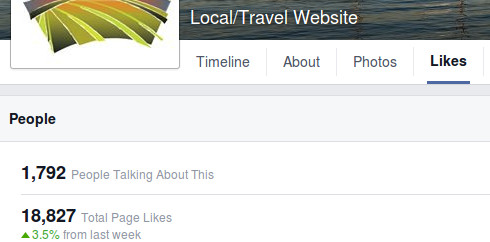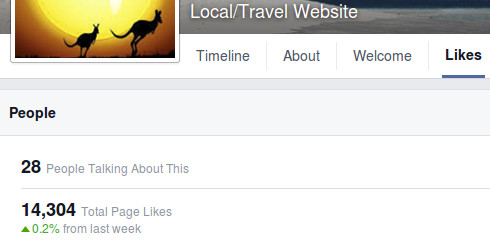When we think about safeguarding a Facebook account or pages, we normally imagine choosing an obscure password or preventing hackers from getting in and hijacking our accounts and pages. However, as we recently discovered, sometimes the biggest threat to Facebook accounts and pages is from Facebook itself.
Here at Travel Victoria, we have three major Facebook business pages related to some of the websites we manage. Combined, these pages have tens of thousands of likes and followers which we have built up over many years.
| Website | Facebook page |
| Travel Victoria | facebook.com/travelvictoria.com.au |
| Beach Stays | facebook.com/BeachStays |
| Dogs On Holidays | facebook.com/DogsOnHolidays |
About 10 days ago, when logging into our personal account to access those pages, Facebook popped up a message saying there had been suspicious activity with our account, so they needed to send us a text message with an access code to our registered mobile phone to ensure it was really us logging in. We thought this was strange, however we went through the process, received the text message, entered in the code, and then we were logged in successfully. Everything was fine for the next week, so we thought nothing of what was perhaps an over zealous automatic security check.
However, a few days ago, when logging into Facebook, this message popped up:

Well, this was a shock! Our account was disabled based on some unidentified violation of community standards, with no other explanation. As such, we couldn’t log in and use our pages.
We requested a review which simply involved us solving a CAPTCHA test and then uploading a personal photo of ourselves.
We thought the review process would be instant, but we were still unable to log into out account. Trying to log in again the next day brought up a message saying that the account was being reviewed and would not be reactivated until the review was successful. We were reminded that we now had 29 days to request a review before the account would be permanently disabled.
Logging in the next day gave the same result – the account was being reviewed, and we now had 28 days to go before the account was disabled permanently.
Due to the fact we had tens of thousands of followers and likes on our several Facebook business pages, which took years to painstakingly build up, we thought we better try another way of getting our account reopened. However, there is no way to contact Facebook by phone or email – all their support is done online. There is a support centre series of web pages, but no online chat mechanism. We discovered a reference to a “support inbox” where you can interact with Facebook, but you need to be logged in to access it, which is useless if your account is disabled. So we decided to wait a few more days and hope our account was reviewed in time.
We planned what to do if the account could not be reactivated. All our posts would be lost, and we would have to start all over again with a brand new account and try and build up our fan base from scratch. In order to do this quickly, it would cost thousands of dollars in Facebook ads and promotions to do what had taken us years. We had invested a lot of time and effort into our Facebook pages, only to have it all thrown away by Facebook itself.
Luckily, after another day, our account was magically reactivated, and all our pages were intact.
So the big question is, how can we safeguard our Facebook account from this happening again? As well as our Facebook pages being inaccessible while these things are sorted out, there is always the real risk of the account staying deactivated permanently. If this happens, our business Facebook pages will be gone forever.
What we did is set up a backup personal Facebook account (yes, it’s against the rules!), and made that account an additional administrator of all our Facebook pages. So if our original Facebook account is ever deactivated, we can still access and fully manage the Facebook pages from our backup account, thus preserving our years of work.
The moral of this story is always have more than one administrator for a Facebook page to ensure that if access to one account is lost for whatever reason, then you have some way of managing that page through the other account. Otherwise if you only have one administrator, you only need Facebook to suddenly suspend that account on a whim, and your pages could be lost forever.



